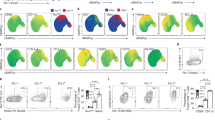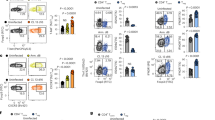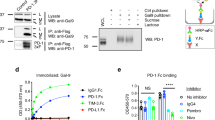Abstract
Most recently, we have described the G-protein coupled receptor 83 (GPR83), which is highly expressed by CD4+CD25+ regulatory T cells (Tregs) to be involved in the induction of CD4+Foxp3+ Tregs in the course of an ongoing immune response. Four GPR83 isoforms have been described. Here, we have shown that GPR83 isoform-4, which differs from GPR83 isoform-1 by 20 additional aminoacids in the second cytoplasmatic loop, is predominantly expressed by Tregs. Interestingly, GPR83 isoform-4 but not GPR83 isoform-1 retrovirally transduced T cells were able to interfere with inflammatory responses in vivo. Re-analysis of GPR83 transduced T cells revealed that this in vivo acquisition of suppressive activity was associated with the induction of Treg-associated molecules including Foxp3 in GPR83 isoform-4 but not GPR83 isoform-1 transduced CD4+ T cells under inflammatory conditions. Our results suggest that the 20 additional aminoacids within GPR83 isoform-4 are involved in Treg induction during inflammatory immune responses.
This is a preview of subscription content, access via your institution
Access options
Subscribe to this journal
Receive 6 digital issues and online access to articles
$119.00 per year
only $19.83 per issue
Buy this article
- Purchase on Springer Link
- Instant access to full article PDF
Prices may be subject to local taxes which are calculated during checkout



Similar content being viewed by others
References
Hansen W, Westendorf AM, Buer J . Regulatory T cells as targets for immunotherapy of autoimmunity and inflammation. Inflamm Allergy Drug Targets 2008; 7: 217–223.
Bruder D, Westendorf AM, Hansen W, Prettin S, Gruber AD, Qian Y et al. On the edge of autoimmunity: T-cell stimulation by steady-state dendritic cells prevents autoimmune diabetes. Diabetes 2005; 54: 3395–3401.
Hansen W, Westendorf AM, Reinwald S, Bruder D, Deppenmeier S, Groebe L et al. Chronic antigen stimulation in vivo induces a distinct population of antigen-specific Foxp3 CD25 regulatory T cells. J Immunol 2007; 179: 8059–8068.
Vieira PL, Christensen JR, Minaee S, O'Neill EJ, Barrat FJ, Boonstra A et al. IL-10-secreting regulatory T cells do not express Foxp3 but have comparable regulatory function to naturally occurring CD4+CD25+ regulatory T cells. J Immunol 2004; 172: 5986–5993.
Hansen W, Loser K, Westendorf AM, Bruder D, Pfoertner S, Siewert C et al. G protein-coupled receptor 83 overexpression in naive CD4+ CD25− T cells leads to the induction of Foxp3+ regulatory T cells in vivo. J Immunol 2006; 177: 209–215.
Harrigan MT, Campbell NF, Bourgeois S . Identification of a gene induced by glucocorticoids in murine T-cells: a potential G protein-coupled receptor. Mol Endocrinol 1991; 5: 1331–1338.
Harrigan MT, Baughman G, Campbell NF, Bourgeois S . Isolation and characterization of glucocorticoid- and cyclic AMP-induced genes in T lymphocytes. Mol Cell Biol 1989; 9: 3438–3446.
Lu LF, Gavin MA, Rasmussen JP, Rudensky AY . G protein-coupled receptor 83 is dispensable for the development and function of regulatory T cells. Mol Cell Biol 2007; 27: 8065–8072.
Sugimoto N, Oida T, Hirota K, Nakamura K, Nomura T, Uchiyama T et al. Foxp3-dependent and -independent molecules specific for CD25+CD4+ natural regulatory T cells revealed by DNA microarray analysis. Int Immunol 2006; 18: 1197–1209.
Toms C, Jessup H, Thompson C, Baban D, Davies K, Powrie F . Gpr83 expression is not required for the maintenance of intestinal immune homeostasis and regulation of T-cell-dependent colitis. Immunology 2008; 125: 302–312.
Tone Y, Furuuchi K, Kojima Y, Tykocinski ML, Greene MI, Tone M . Smad3 and NFAT cooperate to induce Foxp3 expression through its enhancer. Nat Immunol 2008; 9: 194–202.
Wu Y, Borde M, Heissmeyer V, Feuerer M, Lapan AD, Stroud JC et al. FOXP3 controls regulatory T cell function through cooperation with NFAT. Cell 2006; 126: 375–387.
Huber S, Schrader J, Fritz G, Presser K, Schmitt S, Waisman A et al. P38 MAP kinase signaling is required for the conversion of CD4+. PLoS One 2008; 3: e3302.
Gondek DC, Lu LF, Quezada SA, Sakaguchi S, Noelle RJ . Cutting edge: contact-mediated suppression by CD4+CD25+ regulatory cells involves a granzyme B-dependent, perforin-independent mechanism. J Immunol 2005; 174: 1783–1786.
Grossman WJ, Verbsky JW, Barchet W, Colonna M, Atkinson JP, Ley TJ . Human T regulatory cells can use the perforin pathway to cause autologous target cell death. Immunity 2004; 21: 589–601.
Reinwald S, Wiethe C, Westendorf AM, Breloer M, Probst-Kepper M, Fleischer B et al. CD83 expression in CD4+ T cells modulates inflammation and autoimmunity. J Immunol 2008; 180: 5890–5897.
Acknowledgements
We are very grateful to Carolin Wevers for excellent technical assistance and Lothar Groebe, Witold Bartosik and Annika Frede for cell sorting.
Author information
Authors and Affiliations
Corresponding author
Ethics declarations
Competing interests
The authors declare no conflict of interest.
Rights and permissions
About this article
Cite this article
Hansen, W., Westendorf, A., Toepfer, T. et al. Inflammation in vivo is modulated by GPR83 isoform-4 but not GPR83 isoform-1 expression in regulatory T cells. Genes Immun 11, 357–361 (2010). https://doi.org/10.1038/gene.2010.5
Received:
Revised:
Accepted:
Published:
Issue Date:
DOI: https://doi.org/10.1038/gene.2010.5
Keywords
This article is cited by
-
Efficient nucleic acid delivery to murine regulatory T cells by gold nanoparticle conjugates
Scientific Reports (2016)
-
Regulatory T cells and immune regulation of allergic diseases: roles of IL-10 and TGF-β
Genes & Immunity (2014)
-
ChIP-on-chip analysis identifies IL-22 as direct target gene of ectopically expressed FOXP3 transcription factor in human T cells
BMC Genomics (2012)



